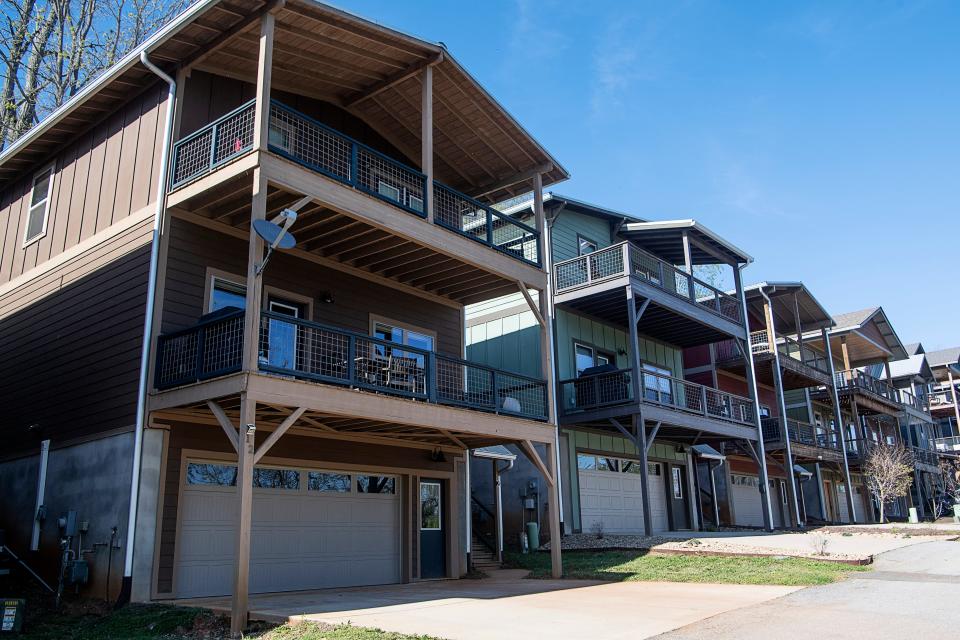Tourism authorities revise Asheville area Airbnb data after Citizen Times story
ASHEVILLE - Tourism officials have revised data used in a Citizen Times analysis on the stunning growth of the short-term rental industry, saying their numbers misrepresented its size.
The change reflects the difficulty in gauging the breadth of the sometimes informal and still partially underground business that by all accounts has grown massively with the introduction of online platforms, such as Airbnb and VRBO. That is according to the owner of the largest local STR business and local and state government officials, some of whom see the industry as a significant contributor to the local housing crisis.
Unchanged are sales numbers reported July 3 by the Citizen Times and tracked by the Buncombe County Tourism Development Authority, a governmental body. Those showed revenue growth of more than 1,000% since 2016, from $18.7 million to $229 million countywide. Hotel sales grew 53% in that time.
The fault was found in the number of STRs (sometimes called short-term vacation rentals), which were reported as 10,000 but are actually less than 6,000, according to the revised TDA data.

The original analysis came from a Jan. 28 TDA meeting presentation that said, "there is now more vacation rental supply than hotel room supply." It included annual percentage breakdowns between the two lodging types.
The percentages were wrong, TDA spokesperson Ashley Greenstein said July 7, because there was a double count. The numbers were also meant to represent STR rooms, not individual listings, Greenstein said.
The revised data shows 9,143 STR rooms countywide with 5,223 individual listings, she said. Listings can mean anything from an individual room for rent to a whole house with many rooms. There are 9,034 hotel rooms in the county.
Asked about the difficulty in tracking the rental numbers, Greenstein said the industry is much more changeable than the traditional hotel business.
"The number of vacation rental listings frequently fluctuates. Homeowners may choose at any time to remove a listing or add one," she said.
The TDA gets its data from the county and private contractors. It tracks the numbers to understand trends and also because sales affect the 6% tax that it receives from lodging businesses. Most of the tax goes to tourism marketing for Asheville and the rest of the county.
Chip Craig, owner of Greybeard Realty which manages 285 STRs in nine area counties, said tracking the local market is difficult because it is highly "fragmented."
"Of the professionally managed homes, we're the largest, and we're not that big. Probably 75% are individually managed. That's why it's so hard to get the data," said Craig, a former TDA member.
Craig acknowledged the industry has boomed, but questioned whether the sales numbers overstated the growth. Some was due to STR owners who had not paid the occupancy tax but then began to do so, he said. The tax is how sales are measured.
Black Mountain short-term rentals: Short-term rentals pose problems for some in Black Mountain but a boon for tourism economy
Woodfin rentals: Woodfin council in split vote greenlights restrictions on short-term rentals
One way the industry could be better gauged is through state regulation, said Tim Moffitt, a member of North Carolina Senate who lives in Henderson County and owns an STR.
In several ways, Asheville and Buncombe County elected leaders oppose a bill proposed by Moffitt that would take away much of local governments' ability to regulate STRs, including a virtual ban inside Asheville.
An exception to the ban enacted in 2018 are "homestays," which mean the renting of one or two rooms within homes. A long-term resident must be present at the time. Even with that clampdown, illegal rentals persist, according to Andrew Fletcher a professional musician, renter and city downtown spaces task force chair. Fletcher could not be reached for comment July 7 but has said STRs tear apart the "fabric" of neighborhoods and take away housing from locals.
But Moffitt said he wanted to work with Asheville and county officials and provide ways they could manage the industry, including by mandating better reporting by STR owners.
"I believe in creating thoughtful policy. And in order to do so we have to identify everybody in every market that is participating in this enterprise," he said.
Joel Burgess has lived in WNC for more than 20 years, covering politics, government and other news. He's written award-winning stories on topics ranging from gerrymandering to police use of force. Got a tip? Contact Burgess at jburgess@citizentimes.com, 828-713-1095 or on Twitter @AVLreporter. Please help support this type of journalism with a subscription to the Citizen Times.
This article originally appeared on Asheville Citizen Times: Tourism officials revise Asheville area Airbnb data after CT story

